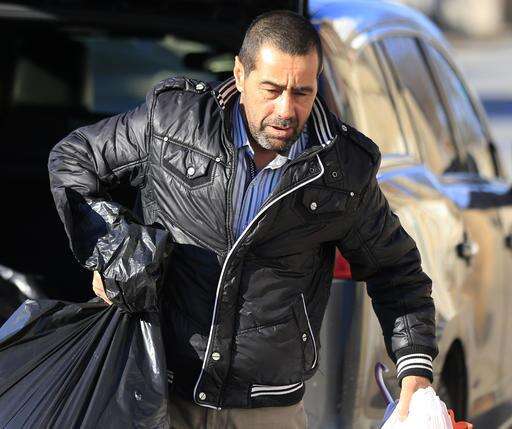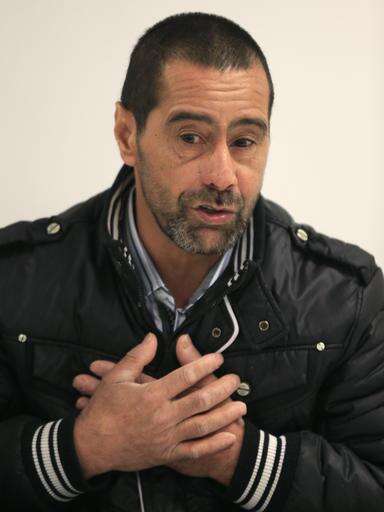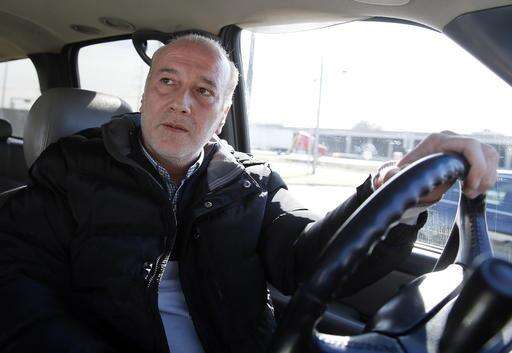Syrian refugee Ahmad Alabood answers a question during an interview in Kansas City, Mo., Friday, Jan. 27, 2017. Alabood told The Associated Press through an interpreter that he, his wife and five children have been treated warmly since they arrived in Missouri last year. Alabood whose family was the first to be resettled in the U.S. as part of the U.S. "surge" refugee program says President Donald Trump should help topple Syriaâs regime rather than press to close off U.S. borders to more refugees. (AP Photo/Orlin Wagner)
The Associated Press
KANSAS CITY, Mo. (AP) - Ahmad Alabood, whose family was the first to be resettled in America as part of the "surge" refugee program, wishes President Donald Trump would help topple Syria's regime rather than press to close off U.S. borders to those fleeing a torn homeland.
"The Syrian people deserve better than this," Alabood, 48, who along with his wife and five children arrived last spring in Kansas City, Missouri, told The Associated Press through a translator Friday.
The sentiment was shared some 550 miles away by Motaz Alafandi, a 49-year-old Syrian living in Dallas while seeking asylum with his wife and three youngest kids, ages 14, 11 and 5.
"I wish that Mr. President (Trump) can help in stopping the war in Syria," said Alafandi, who said he loves the U.S. and the American people but does hope to return one day to his homeland. "If my country will become good again, I won't stay here."
Such laments about Syria - reeling from a civil war that has spawned hundreds of thousands of refugees - come as Trump on Friday signed an executive order imposing "new vetting measures" that he says are aimed at keeping "radical Islamic terrorists" out of the United States, saying "we don't want them here." Trump said he only wants to admit people to the U.S. who will support the country.
Among the order's directives are that the U.S. stop issuing visas to Syrian nationals and halt the processing of Syrian refugees until security changes are made, and suspend all immigration from countries with terrorism concerns for 90 days. It was unclear which countries would be affected, though a draft of the order obtained by The Associated Press pointed to a legal provision identifying Iran, Iraq, Libya, Somalia, Sudan, Syria and Yemen, all majority-Muslim countries.
The city of Rutland, Vermont , had planned to welcome 100 refugees from Syria and Iraq, but with Trump's Friday order the community expects to see only the two Syrian families that arrived this month.
Ahmed Khatib, 37, said he, his wife Mahasen Boshnaq, and their three young children arrived there Jan. 19, and in a Friday interview he said they feel lucky. Day by day they are settling in and Khatib has started talking with people about getting work. After studying agricultural technology in college he hopes to finish his degree in the U.S. Khatib said he looks forward to being self-sufficient, working, having a home for his family and school and clothing for his children.
He doesn't think Trump's opinion reflects Americans, who he said want to allow refugees in the country.
"They are very nice and they are very helpful and welcoming," Khatib said. "I care about what the America people want and I feel that they want refugees."
Alabood said restricting the flow of refugees into the U.S. - out of concern that waves of refugees haven't been or can't be properly vetted by the U.S. to weed out the terrorism-minded - could deepen American suspicion and fan anti-Muslim hostility. Critics of the proposed moves have labeled them reckless and un-American.
"There are certain (American) people that would take it to an extreme" and lash out, said Alabood, a former construction worker in his homeland. "There are lots of people in desperate need of help, and this is a great country to help them," he added.
Afghans and Iraqis who have worked as interpreters for the U.S. military fear the executive action that will bring sweeping changes to the nation's refugee policies will mean their families will be stuck in their homelands, where they may be targeted for violence because they have worked for the Americans. Recently arrived interpreters accompanied by military veterans and elected officials gave a news conference in San Diego on Friday, asking President Trump to not close the doors to refugees.
Abdul Manan, 31, an Afghan interpreter who worked for the Army and special forces for eight years, arrived in San Diego two months ago. He fears for his family after fleeing his homeland amid death threats. It took him three years to get out on a special immigrant visa but his relatives remain in his village and have been threatened.
Manan suggested Trump talk to the military and veterans who will attest to the risk interpreters took to help troops.
"They have sacrificed their lives and their family's lives and now they are left behind. I think of the history of America. Is that how they do? If someone helps them and they're left behind, they're at the mercy of the terrorists - ISIS."
Since settling in Missouri nine months ago, Alabood has chased the American dream, albeit in baby steps. He's earning $10.25 an hour making plastic car parts, trying to learn English and has a four-bedroom rental home to go along with his donated 2000 minivan. His $725 monthly rent tab leaves him unable to afford health insurance.
Yet he gushes of the graciousness of Kansas City, saying he's not been subjected to anti-Muslim sentiment in the Midwest. His brother has joined him, arriving in Kansas City five months ago with his three kids, ages 8, 6 and 4.
In Dallas, Alafandi enjoys a temporary protected status, which has allowed him to get a work permit and driver's license. Alafandi, who came with his family to the U.S. in 2014 and awaits word on his asylum application, has a tow truck business.
"Sometimes we feel that everybody is against us," fostering a feeling of being unwelcomed, he said. "Our people are killed in Syria, and when they try to find a way to survive, people are kicking them out and dealing with them badly."
"I wish that we will be treated as a human beings that are seeking shelter and are seeking to be secure with our families," he added. "We are just asking to be safe and find jobs and feed our kids."
___
Associated Press reporters Jamie Stengle in Dallas, Lisa Rathke in Rutland, Vermont, Julie Watson in San Diego and Jim Salter in St. Louis contributed to this report.
Syrian refugee Ahmad Alabood, right, and interpreter Fariz Turkmani, left, talk during an interview at Della Lamb Community Services in Kansas City, Mo., Friday, Jan. 27, 2017. Alabood told The Associated Press through the interpreter that he, his wife and five children have been treated warmly since they arrived in Missouri last year. Alabood, whose family was the first to be resettled in the U.S. as part of the U.S. "surge" refugee program, says President Donald Trump should help topple Syriaâs regime rather than press to close off U.S. borders to more refugees. (AP Photo/Orlin Wagner)
The Associated Press

Syrian refugee Ahmad Alabood helps carry donated goods into Della Lamb Community Services in Kansas City, Mo., Friday, Jan. 27, 2017. Alabood told The Associated Press through an interpreter that he, his wife and five children have been treated warmly since they arrived in Missouri last year. Alabood says he's concerned that efforts to restrict the flow of refugees into the U.S. could wrongly cast those displaced in an unfavorable light among some Americans, fanning anti-Muslim sentiment. (AP Photo/Orlin Wagner)
The Associated Press
In this Thursday, Jan. 26, 2017 photo, Dalal Alia, 35, and her daughter, Yara Dalati, 5, prepare dinner at their home in Anaheim, Calif. Dalal Alia is originally from Syria and still has brothers, nieces and nephews she fears are in danger and will not be able to reach the U.S. under President Donald Trump's administration. (AP Photo/Christine Armario)
The Associated Press
Syrian refugee Ahmad Alabood, right, and interpreter Fariz Turkmani, left, talk during an interview at Della Lamb Community Services in Kansas City, Mo., Friday, Jan. 27, 2017. Alabood told The Associated Press through the interpreter that he, his wife and five children have been treated warmly since they arrived in Missouri last year. Alabood says he's concerned that efforts to restrict the flow of refugees into the U.S. could wrongly cast those displaced in an unfavorable light among some Americans, fanning anti-Muslim sentiment. (AP Photo/Orlin Wagner)
The Associated Press

Syrian refugee Ahmad Alabood answers a question during an interview in Kansas City, Mo., Friday, Jan. 27, 2017. Alabood, whose family was the first to be resettled in the U.S. as part of the U.S. "surge" refugee program, says President Donald Trump should help topple Syriaâs regime rather than press to close off U.S. borders to more refugees. Alaboodâs assessment Friday through a translator came hours before Trump signed an executive action imposing "new vetting measures" that he says are aimed at keeping "radical Islamic terrorists" out of the U.S. (AP Photo/Orlin Wagner)
The Associated Press
Syrian refugee Ahmad Alabood stops for a photograph where he works at a USF plant in Riverside, Mo., Friday, Jan. 27, 2017. Alabood said his wife and five children have been treated warmly since they arrived in Missouri last year. (AP Photo/Orlin Wagner)
The Associated Press
Syrian refugee Ahmad Alabood packs parts where he works at a USF plant in Riverside, Mo., Friday, Jan. 27, 2017. Alabood said his wife and five children have been treated warmly since they arrived in Missouri last year. (AP Photo/Orlin Wagner)
The Associated Press
Syrian refugee Ahmad Alabood packs parts where he works at a USF plant in Riverside, Mo., Friday, Jan. 27, 2017. Alabood said his wife and five children have been treated warmly since they arrived in Missouri last year.(AP Photo/Orlin Wagner)
The Associated Press
Motaz Alafandi of Syria shows a photo he keeps on his smart phone of his daughter Yara, 18, who lives in Montreal, Friday, Jan. 27, 2017, in Garland, Texas. Alafandi, a 49-year-old Syrian lives in Dallas while seeking asylum with his wife and three youngest children, ages 14, 11 and 5. "I wish that Mr. President (Trump) can help in stopping the war in Syria," said Alafandi, who said he loves the U.S. and the American people but does hope to return one day to his homeland. (AP Photo/Tony Gutierrez)
The Associated Press

Motaz Alafandi of Syria sits in his car after giving an interview on his pending case for political asylum, Friday, Jan. 27, 2017, in Garland, Texas. Alafandi, 49, lives in Dallas while seeking asylum with his wife and three youngest children, ages 14, 11 and 5. "I wish that Mr. President (Trump) can help in stopping the war in Syria," said Alafandi, who said he loves the U.S. and the American people but does hope to return one day to his homeland. (AP Photo/Tony Gutierrez)
The Associated Press
Syrian refugee Ahmed Khatib and his wife Mahasen Boshnaq, rear, stand in the home of their sponsoring family Friday, Jan. 27, 2017, in Rutland, Vt. After studying agricultural technology in college, Khatib said he hopes to finish his degree in the U.S. (AP Photo/Lisa Rathke)
The Associated Press
Syrian refugees Dania Khatib, 5, with her mother Mahasen Boshnaq, rear, holding her brother Mohammed, 1, sits in the home of their sponsoring family Friday, Jan. 27, 2017, in Rutland, Vt. The Khatib family arrived in Rutland this month. (AP Photo/Lisa Rathke)
The Associated Press
Newly arrived refugee Dania Khatib, 5, tours a classroom with her mother Mahasen Boshnaq, center rear, and father Ahmed Khatib, right, at the Northwest Primary School Friday, Jan. 27, 2017, in Rutland, Vt. The Khatib family arrived in Rutland this month. (AP Photo/Lisa Rathke)
The Associated Press
Kerry Coarse, coordinator for support services for the Northwest Primary School, shows Dania Khatib, 5, the school playground as her mother Mahasen Boshnaq, left, and father Ahmed Khatib, right, follow behind in Rutland, Vt. The Syrian refugee family arrived in Rutland this month. Khatib said he looks forward to being self-sufficient, working, having a home for his family and school and clothing for his children. (AP Photo/Lisa Rathke)
The Associated Press
Refugees Mustafa, left, Mohammed, and Dania Khatib play in the home of their sponsoring family Friday, Jan. 27, 2017, in Rutland, Vt. Their father Ahmed Khatib said he looks forward to being self-sufficient, working, having a home for his family and school and clothing for his children. (AP Photo/Lisa Rathke)
The Associated Press